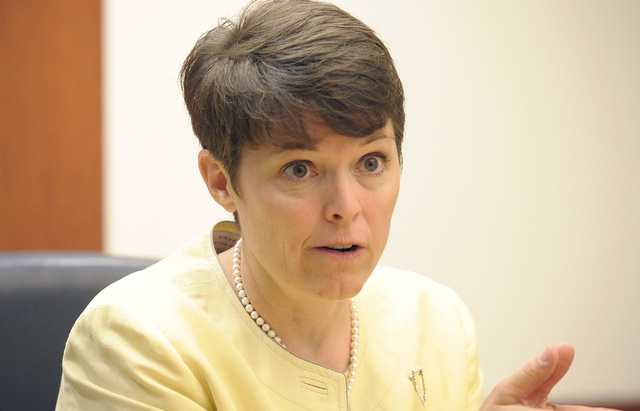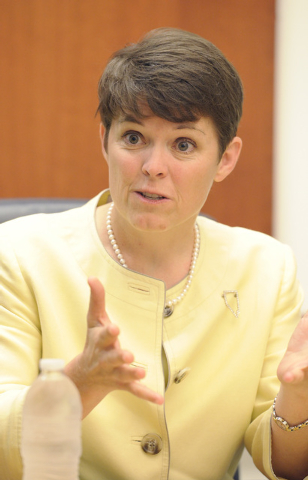CCSD offers settlement in board member lawsuit


Clark County School Board President Erin Cranor may personally cost taxpayers $100,100 for her interference in school employees’ health insurance coverage and acting without the required approval of fellow board members.
Health insurance negotiator Business Benefits Inc. sued the Clark County School District in May but also singled out Cranor by alleging she stepped outside her duties as a trustee by demanding that the district cut its contract “as soon as possible,” as shown in an October email Cranor sent to Superintendent Pat Skorkowsky. The district stepped in Monday and offered a settlement of $100,100 to end Cranor’s portion of the case, using taxpayer money to foot Cranor’s bill.
“I’m not surprised we were offered a settlement for Cranor,” said Erika Pike Turner, a Gordon Silver lawyer representing Business Benefits. “It was a surprise that the school district wanted to pay for it.”
The district has also been paying for Cranor’s lawyer, arguing it must do so under state law that requires the district represent an official sued for acts related to that person’s public duties, district spokeswoman Kirsten Searer said. Cranor is being sued, however, because she stepped outside her duties, contend Business Benefits and Stephen Augspurger, executive director of the union representing district administrators.
“To think that taxpayers are footing the bill for an elected official going rogue,” Augspurger said. He said he is “absolutely concerned with the school district settling for Cranor, who acted outside her duties, writing a demand letter,” let alone paying for her lawyer.
Augspurger has been subpoenaed in the continuing case against the district, which could cost taxpayers much more as it approaches court.
The district won’t reveal the legal costs — in addition to the $100,100 settlement — of representing Cranor in this case because it’s still open, Searer said. But the settlement limits the potential liability to the district in this case by half, she said.
The settlement doesn’t end the lawsuit for the district, which also is named as a defendant, accused of wrongful termination of Business Benefits’ contract and not paying for services rendered. Business Benefits was the district’s health plan negotiator.
Though the district has offered to pay Cranor’s $100,100 settlement, it’s not final. A majority of the board must approve it. The Review-Journal couldn’t reach the School Board’s six other board members on Tuesday.
The district and Cranor, however, have made it clear they want her part of the case settled, even though the lawsuit against the district will go on. The $100,100 settlement offer for Cranor exceeds the maximum award of $100,000 allowed in court for intentional tort damages.
The district offered such a large settlement so “we’d have to take it,” Turner said. Business Benefits accepted the settlement offer Monday. But had it refused and had the court awarded the maximum amount in the case, Business Benefits would have to pay Cranor’s legal fees because it declined the larger offer.
Searer said the district’s head lawyer Carlos McDade decided with the district’s outside attorneys to settle Cranor’s case. However, the final word lies with Superintendent Skorkowsky, who acted on Cranor’s call to terminate Business Benefits’ contract.
Cranor’s October email to Skorkowsky went on to say, “It appears there may be intent to continue to the current contract with the broker (Business Benefits), even though the contract is now known to be unfavorable to the district.”
But the district sent its termination notice to the company on the last day of the contract, which requires 180 days’ notice in advance of the contract expiration.
The district said the termination would be effective 180 days later, on June 30.
However, the length of Business Benefits’ contract is tied to the health plans it negotiated with Health Plan of Nevada, which don’t expire until Dec. 31, 2016.
The lawsuit alleges the district’s attempt to terminate the contract “effectively denies” Business Benefits for services rendered.
“Despite that Cranor knew (or should have known) that the contract could not be terminated for convenience,” she advocated without authority from her fellow board members that the district “terminate the contract without cause,” according to the lawsuit.
For the district to cancel its contract with Business Benefits, it needed to do so before June 30, 2013, providing the 180 days’ notice required from the end of the contract on Dec. 31, 2013.
However, the order from the district at that time was to negotiate a health plan and “fix” an emergency account that the district had wrongfully depleted, according to the lawsuit.
The district currently provides health insurance for its 11,000 school support staff and about 150 police officers. It also pays labor unions to provide insurance for its 1,300 school administrators and 18,000 teachers.
Contact Trevon Milliard at tmilliard@reviewjournal.com or 702-383-0279. Find him on Twitter: @TrevonMilliard.












